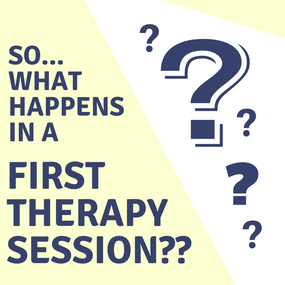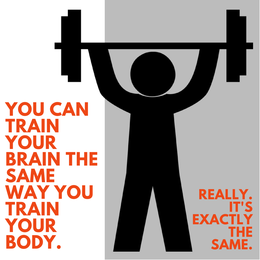 People put off starting therapy for a lot of different reasons, even when they know they really need help with something. Over the years I've heard a lot of different whys and wherefores for avoiding therapy and a lot of them boil down to this: "It'll feel weird/bad/scary/sad to say all this out loud because it's super personal/awkward/scary/upsetting/overwhelming. What's the point?" Of course, it feels much better once you're in it. And it feels great when you're done. But what happens between the before and after? You start. Starting is hard but nothing happens until you start. And it's easier to start when you know what to expect. I had a client recently tell me how helpful it had been to hear me describe during our consultation what his first session would be like. After that, he knew exactly what to expect. So for anyone else out there who needs to know what happens in a first therapy session, here you go. These are the things you can expect, as well as a few things you should consider, whether you're considering therapy with me or someone else. First, things first - hopefully-not-awkward introductions, shaking hands, smiling and settling in. (Insider tip: if there's a sofa, that's probably for you and the therapist usually takes the big chair. If you're not sure, look for the clipboard and then take the other seat!) Settle in and take this time to assess a few things. First, do you get a good vibe from this person? How does the fit feel? The very, very first sentence Dr. Romano uttered in my very first therapy class is highly applicable here: "The most important thing to remember as a therapist is this: Just be normal." We all laughed at the time, but it's true, right? Normal is completely underrated. And normal is completely relative to YOU. Does this person feel like a good match to your normal? Is this someone you can talk to? Do you feel comfortable with him or her? Next, usually comes a little chit chat and then I give people a general outline of what to expect over the next 50 minutes or so. These are the things in that list, though they often vary in order depending on how things go:
And that's it! A little chit chat, some questions from me, some questions from you, and you're done with your first session. It's not scary and it can feel really good to get it all out there. And pretty soon you'll be deep into the work, which is when the real fun begins. But first, you have to start.
2 Comments
 If you've ever tried to get in shape or learn a sport, you know that getting from incompetence to competence is really hard. It involves a lot of discomfort, both physical and mental. Doing new physical exercises can make muscles ache where you didn't even know you had muscles. (I'm very familiar with this feeling!) But in the back of your mind, you know that every workout and each ache and pain is a step toward your goal. The short term discomfort is worth the long term gain of health and strength. Therapy is like training. People come to therapy when they know they want to be stronger and healthier in some area of mental health and they don't know how to get there on their own. Like training, therapy also involves discomfort. If you've never done a pushup before, you're going to feel pretty weak and uncomfortable when you start. You might even be embarrassed that pushups are a problem for you. In the same way, if you've never developed coping skills for anxiety, or healthy relationships (and lots of people haven't), you're going to feel uncomfortable when you first try that, too. It's exactly the same. If you've ever done physical training, then you know how it goes. First, you identify a goal, then the skills needed to achieve that goal, and then you break those down into smaller, modified steps that you repeat over and over until you've mastered them, building up to where you want to be. Take pushups, for example. You'd start pushups against a wall, and then a counter top, and then the side of a bathtub, and then the floor with knees down and then, finally, hands and feet on the floor. (If you want to try it for real, don't take my advice! You're better off looking at Mark Lauren's books, You Are Your Own Gym, which are awesome.) For anxiety you could start with simply identifying the physical feelings, then identifying the triggers, then exploring the beliefs you have about the triggers and yourself, and then practicing coping skills like breathing or journaling or reframing, and of course, some exposure therapy and maybe some EMDR. Simple, right? Okay, so anxiety is a little more complicated than pushups. But my point is, the first time you try to really dig into one of those steps, you're going to be uncomfortable, and you'll probably wonder what the point is and you might feel like you're not getting anywhere and that progress is impossible and maybe pointless. But it's not. Just like you first learned to play football or rock climb or run track or play basketball, you can learn to tackle new mental skills, too. You just have to dig in, over and over. The brain is like a muscle. You can strengthen and teach it to new levels of skill and ability. As a trainer in my neighborhood has written on the windows of her gym: Try Trying. It pays off. |
 RSS Feed
RSS Feed